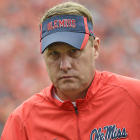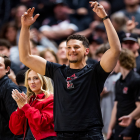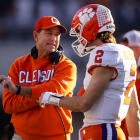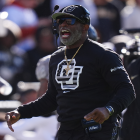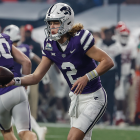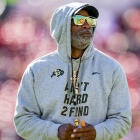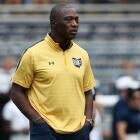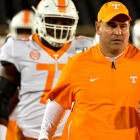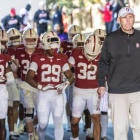Ole Miss will self-impose a one-year postseason ban in 2017 after receiving an official notice of allegations from the NCAA, which concluded its investigation into violations made by the football program, the school announced Wednesday.
According to Ole Miss, the NCAA has come to the conclusion that the “scope and nature of the violations demonstrate that the university lacked institutional control and failed to monitor the conduct and administration of its athletics program.” Ole Miss will contest this serious Level I violation, among others.
Ole Miss received the official notice of allegations from the NCAA, which included eight new charges against the football program as well as the expansion of a ninth initially made against the program earlier as part of 13 violations announced in a notice of allegations last May. That brings the total number of football-related charges against Ole Miss to 21.
The self-imposed bowl ban, which will also include the school forfeiting approximately $7.8 million in SEC postseason revenue, comes on top of Ole Miss previously self-imposing an 11-scholarship reduction in football (one from 2015, two from 2016 and four from 2017 and 2018 incoming classes), suspending two assistants from recruiting, accepting a $159,352 fine and putting its staff through additional NCAA rules training. The postseason ban is the first postseason ban by an SEC football program since Mississippi State in 2004.
Of the new charges, including the lack of institutional control and failure to monitor allegation, seven are Level I violations and two are considered Level III violations. None of the violations are supposedly tied to issues raised around the 2016 NFL Draft involving Laremy Tunsil.
Ole Miss announced that there are three allegations against the school which it believes there is sufficient evidence to prove the violations occurred. They are:
- A recruit went hunting near campus on the private land of a program booster on multiple occasions after he had enrolled at the school. (Level III)
- Between March 2014 and January 2015, a former Ole Miss staff member arranged for lodging and transportation for one recruit and his companions on multiple visits to campus, as well as impermissible transportation to another recruit on one occasion. The total value of these benefits between the two recruits was approximately $2,272. The first recruit did not enroll at Ole Miss. (Level I)
- The same ex-staffer knowingly committed NCAA recruiting violations between March 2014 and February 2015 and provided false and misleading information to the school and enforcement staff in 2016. (Level I)
There’s a fourth new allegation against the school of which Ole Miss agrees there is some evidence to support part of the charge but not the entirety of it.
- The ex-staffer allegedly “initiated and facilitated two boosters having impermissible contact” with a recruit who enrolled at another school. “It is further alleged that these two boosters provided [the recruit] with impermissible cash payments during that timeframe and that [the ex-staffer] knew about the cash payments. The value of the alleged inducements according to the NCAA is between $13,000 and $15,600.” (Level I)
Ole Miss agrees there’s evidence to support the contact between the parties took place, but claims there isn’t enough evidence to support the total of the alleged payments. Ole Miss says they are still evaluating those claims and plan to “make that determination over the course of the next 90 days.”
These are the other five new allegations that Ole Miss says it plans to contest “in full.”
- The ex-staffer arranged for different recruits and some of their friends to “receive impermissible merchandise” totaling approximately $2,800 “from a store owned by a booster” from 2013-16. (Level I)
- A current coach had impermissible contact with a recruit off campus. (Level III)
- A booster that owned a restaurant “provided money, food and drinks” to a recruit and those that joined him on two or three occasions between March 2014 and January 2015 at a value of $200-$600. (Level I)
- Coach Hugh Freeze “violated head coach responsibility legislation” as being responsible for the allegations that occurred between October 2012 and January 2016. (Level I)
The overall “scope and nature of the violations demonstrate that the university lacked institutional control and failed to monitor the conduct and administration of its athletic program.” This was an extension of the one of the previous 13 violations. (Level I)
Freeze spoke out against the idea that he lacks institutional control of his own program.
“From the moment I arrived in December 2011, I have emphasized to all of my staff that our program is founded on certain core values -- faith, attitude, mental toughness, integrity and love,” said Freeze in the video announcing the new allegations. “Integrity -- doing things the right way. I am extremely disappointed to learn that any member of my staff violated any SEC or NCAA rules, and as the head coach, I regret those actions.
“Any behavior by my staff that is inconsistent with that commitment to do things the right way simply does not reflect the emphasis I personally place on NCAA compliance. As the record will show, I am constantly communicating to our compliance office, the SEC office and industry leaders to make sure we are using best practices when it comes to doing things the right way. Contrary to the allegations, I have demonstrated throughout this entire process that I have a strong record of promoting compliance and monitoring my staff, and I look forward to presenting that evidence to the Committee on Infractions.”
Freeze has been at Ole Miss since 2012. His teams have gone 39-25 in five seasons and played in two New Year’s Six Bowls.
Athletic director Ross Bjork said the following about Ole Miss’ defense of these allegations:
We will vigorously defend the university against those allegations we believe are not appropriately supported, including that we lacked institutional control and that our head football coach did not promote an atmosphere of compliance or monitor staff in our football program. In our official response, we will provide detailed, supporting information that demonstrates the institution’s strong control of the athletics program, including football, and Coach Freeze’s commitment to compliance. We know the Committee on Infractions will review and consider our response in a fair and impartial manner, and we look forward to presenting our case to the Committee at the appropriate time.
![[object Object] Logo](https://sportshub.cbsistatic.com/i/2020/04/22/e9ceb731-8b3f-4c60-98fe-090ab66a2997/screen-shot-2020-04-22-at-11-04-56-am.png)








